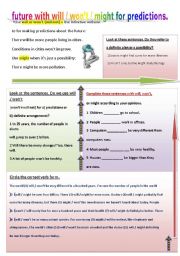
|
future with will / won´┐Żt / might for predictions.
´┐Ż Use will or won´┐Żt (will not) + the infinitive without
to for making predictions about the future:
There will be more people living in cities.
Conditions in cities won´┐Żt improve.
Use might when it´┐Żs just a possibility:
There might be more pollution..
Level: elementary
Age: 14-17
Type: worksheet
Downloads: 106
|
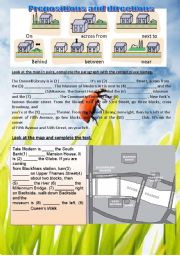
|
preposition of place
Look at the map In pairs, complete the paragraph with the correct place names
Look at the map and complete the text..
Level: intermediate
Age: 14-17
Type: worksheet
Downloads: 78
|
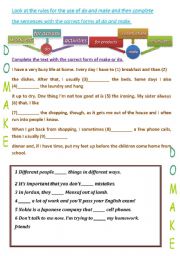
|
do--make
Look at the rules for the use of do and make and then complete
the sentences with the correct forms of do and make
Level: intermediate
Age: 14-17
Type: worksheet
Downloads: 35
|
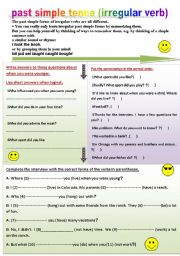
|
past simple forms of irregular verbs
The past simple forms of irregular verbs are all different.
´┐Ż You can really only learn irregular past simple forms by memorizing them.
But you can help yourself by thinking of ways to remember them, e.g. by thinking of a simple sentence with
a similar sound or rhyme:
I took the book.
or by grouping them in your mind:
hit put set taught caugh...
Level: intermediate
Age: 12-17
Type: worksheet
Downloads: 32
|
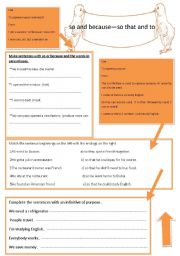
|
so and because´┐Żso that and to
1
To express reason and result.
Form:
I put a sweater on because I was cold.
I was cold, so I put a sweater on
2
To express purpose.
Form:
The to infinitive is used to express purpose. In order to can also be used.
I came to the U.S. to study English.
So that can also be used. It is often followed by could / can or would.
I came to the...
Level: intermediate
Age: 10-17
Type: worksheet
Downloads: 26
|
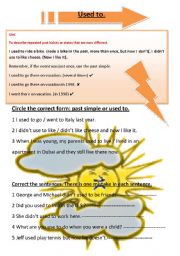
|
Used to.
To describe repeated past habits or states that are now different.
Remember, if the event was just once, use the past simple.
I used to go there on vacation. (several times) ✔
I used to go there on vacation in 1998. ✘
I went there on vacation. (in 1998) ✔
Level: intermediate
Age: 13-17
Type: worksheet
Downloads: 25
|
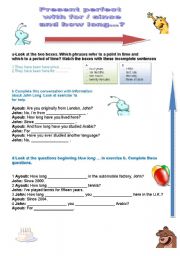
|
present perfect with for / since and how long
Look at the two boxes. Which phrases refer to a point in time and
which to a period of time? Match the boxes with these incomplete sentences
Level: intermediate
Age: 10-17
Type: worksheet
Downloads: 22
|
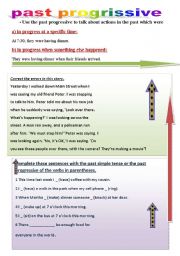
|
past progressive
Use the past progressive to talk about actions in the past which were
a) in progress at a specific time:
At 7:30, they were having dinner.
b) in progress when something else happened:
They were having dinner when their friends arrived.
Level: intermediate
Age: 10-17
Type: worksheet
Downloads: 20
|
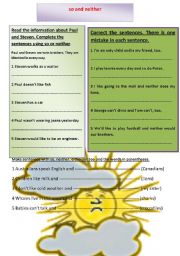
|
so, neither, either, or too
Read the information about Paul and Steven. Complete the sentences using so or neither.
Correct the sentences. There is one mistake in each sentence
Level: elementary
Age: 14-17
Type: worksheet
Downloads: 19
|
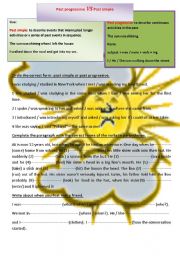
|
Past progressive VS Past simple
Past simple: to describe events that interrupted longer activities or a series of past events in sequence.
Past progressive: to describe continuous activities in the past.
The sun was shining.
Level: elementary
Age: 10-17
Type: worksheet
Downloads: 17
|